Best Wrestling Storyline Every Year 1989-2024
31. 1994: Bret Hart Vs. Owen Hart
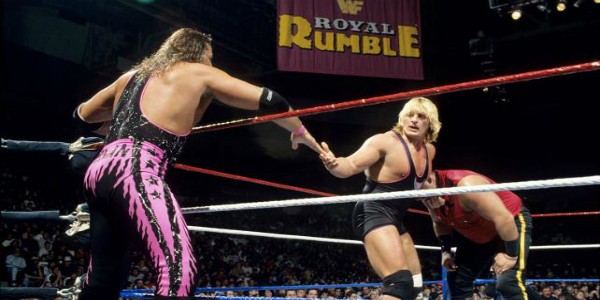
An utterly perfect, no-notes pro wrestling feud.
While the invisible camera drove conflict in a deeply convenient way years later, Owen could have actually watched the footage back over and over again. It wouldn’t have mattered; because his twisted, jealous mind drove the story, and not the convenient plotting, he would have seen what he wanted to see regardless.
Bret’s quest to protect his brother in tags was interpreted by Owen as his bigger brother hogging the spotlight like he always did. That’s why Owen, in retaliation, kicked Bret’s leg out of his leg.
This was very sophisticated by the standards of the era (of course Pat Patterson had to persuade Vince McMahon that brothers do indeed fight and share a complicated relationship). Perhaps there was an arrogant streak to Bret. Perhaps he did think, at the 1994 Royal Rumble, that he could do it by himself. He did, after all, say he was the best there ever will be.
The untenable and deeply relatable disagreement was key. Everybody has had a fight like it with a loved one, where you’re wrong and right at the same time.
The escalation in their technical classic of a WrestleMania X opener was magnificent. Each brother attempted to wrestle two different matches. When Owen simply became too much of a little bastard, Bret had no choice but to snap.
30. 1995: Raven Vs. Tommy Dreamer
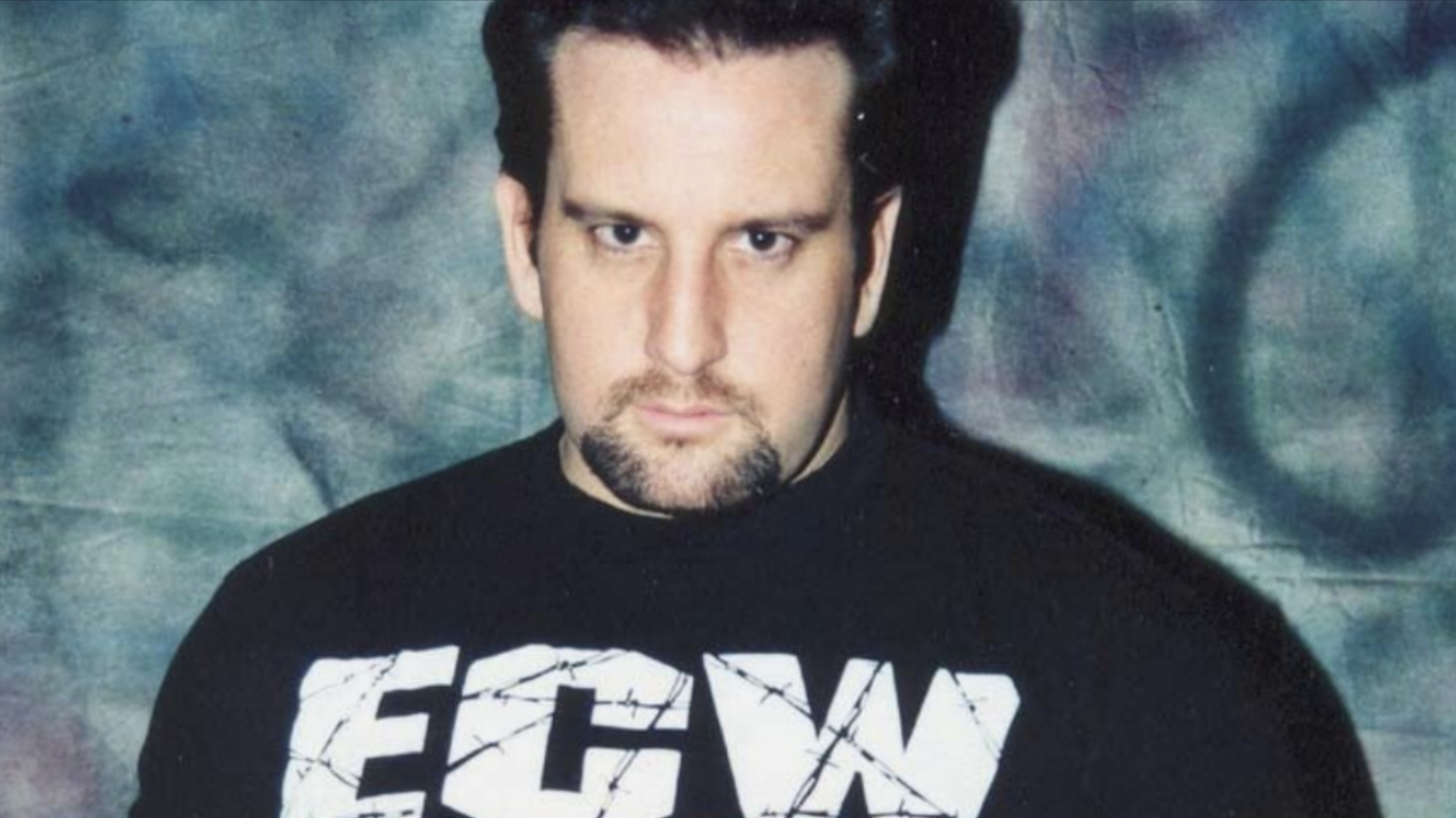
Very much a product of its time, Raven Vs. Dreamer was ambitious, very cheesy, and frankly, Dreamer’s absolutely relentless, teary nostalgia over ECW in the 23 years since it shuttered has made a lot of people never want to hear about it ever again.
Also: shouldn’t the jock have played the heel?
It broke new ground. Few have trodden it since, because it’s such an impossible sell, but the idea that two wrestlers knew one another during a shared adolescence was unprecedented. The premise was a stretch even then, but the ECW hardcores admired a deep level of thought lacking in the mainstream.
At summer camp in the ‘80s, Dreamer was the jock, Raven the tormented introvert who was driven to become a misanthrope. Dreamer embodied everything he hated about mankind, and Raven vowed to end him. Across ‘95 - and much too long afterwards - Dreamer failed to defeat Raven time and time again.
If that all scans as e-fed corniness, through a 2024 lens, that might be because every e-fedder going was so charmed by the tale that they wanted to rip it off.
29. 1996: The New World Order Takes Over
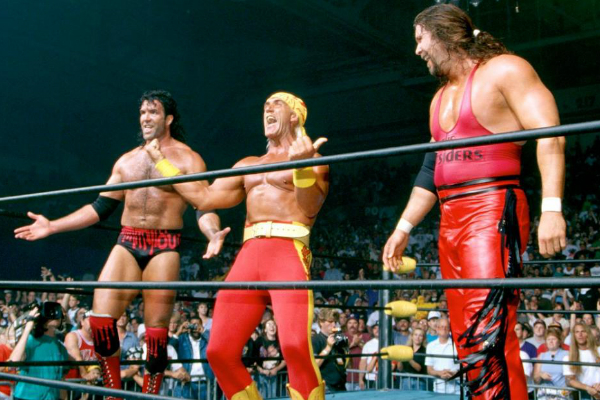
Before it dragged on and on and every other useless tosser on the roster was paraded in a black-and-white t-shirt, the nWo angle was every bit as phenomenal as everybody said it was.
Scott Hall and Kevin Nash were cool and dangerous. Hollywood Hogan wasn’t, but his star power was undeniable.
Tony Schiavone’s commentary run in WCW is defined by his apathy, sadly, but he was exceptional in ‘96 - as good as Jim Ross in conveying his disgust at the stable’s weekly transgressions.
The Order felt like a true threat to the system. Schiavone bemoaning the broadcast falling apart made it seem as if something of value was lost. Hall and Nash smirked as they destroyed what was left, and the weekly chaos, the sense of an imminent explosion, was intoxicating as week-to-week experience.
As good as Eric Bischoff was as the smug narcissist who pulled the strings, in late 1996, the story was better when Ted DiBiase was revealed to have bankrolled the interlopers. In one stunning twist, WCW made sense of the one plot hole and reintroduced one of the all-time great characters.
28. 1997: Steve Austin Vs. The Hart Foundation
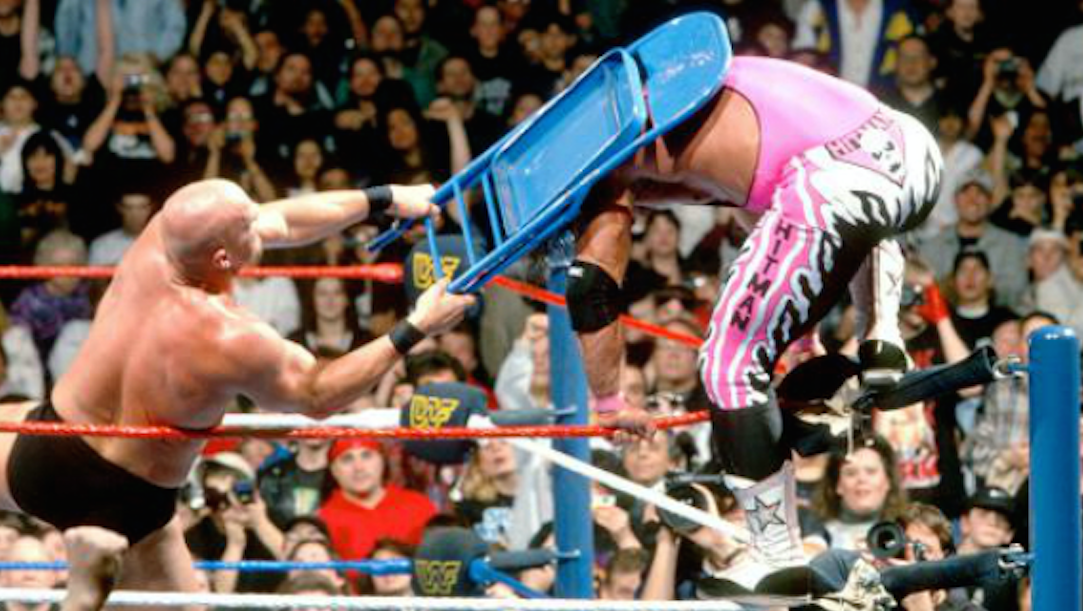
Ahead of WrestleMania 13, Bret’s head was polluted with bitterness; much like his younger brother Owen, with whom he reunited later that year in one of the most well-earned story beats of that nature ever, he believed that everything, and everybody, was conspiring against him.
Bret was on career form in a role which, as the passing of time underscores, he was made to play. He cut the promo of his life - frustrated isn’t the goddamn word for it, seminal wasn’t the goddamn word for it - ahead of what might remain the best WWE match ever held. Steve Austin meanwhile was unbelievable at WrestleMania 13. He sold in a dynamic way without ever once slowing down the pace nor letting the crowd forget that he was in acute agony.
The philosophical shift that reversed the fortunes of the promotion in one incredible match, the finish was unreal. You can watch it several million times, and as Austin cries out in pain with the claret pissing out of his forehead, you’ll never stop believing that the fake sport is real in that moment.
Deeper in the year, Austin battled the Hart Foundation, the peak of which, In Your House: Canadian Stampede, was so thunderous that the hard camera shook as it struggled to capture the melee of the unforgettable USA Vs. Canada main event.
This is what people talk about when they talk about 1997 being better than the Attitude Era proper.
27. 1998: Austin Vs. McMahon
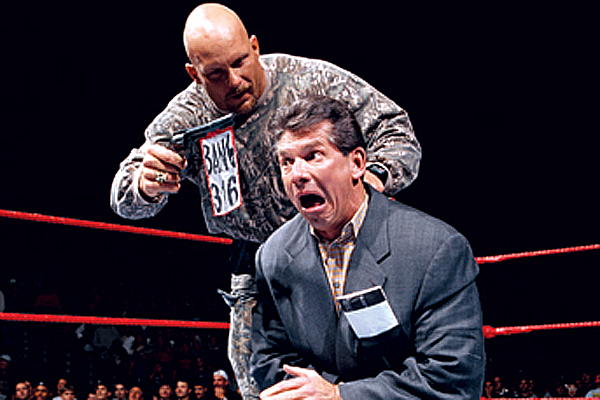
You’d struggle to relive it with quite the same fondness, given Vince McMahon’s appalling exit from the promotion he founded, but the programme was so important and legendary that WWE has asked you to do that countless times already.
Through documentary retrospectives and a million piss-poor retreads - remember when office favourite Roman Reigns was somehow victimised by the Authority? - there was no escaping Austin Vs. McMahon.
It descended into set-piece-heavy schlock within months and made less and less sense the longer it dragged on, but the slapstick was fantastic. WWE absolutely is not “cinema” - but even the most talented foley artist would struggle to capture a sound as funny as Austin braining McMahon over the head with a bedpan.
Before the stupidity, Austin Vs. McMahon - honestly! - was sophisticated comedy. The early attempts to propagandise the WWF as a mom and pop operation that Austin had brought into disrepute - complete with schmaltzy video packages putting over stooge Pat Patterson - were a riot.
On that theme of contrast again: it really doesn’t get any more compelling, cathartic and believable than the beer-swilling everyman outwitting the evil corporate overlord.
26. 1999: Rob Van Dam Vs. Jerry Lynn
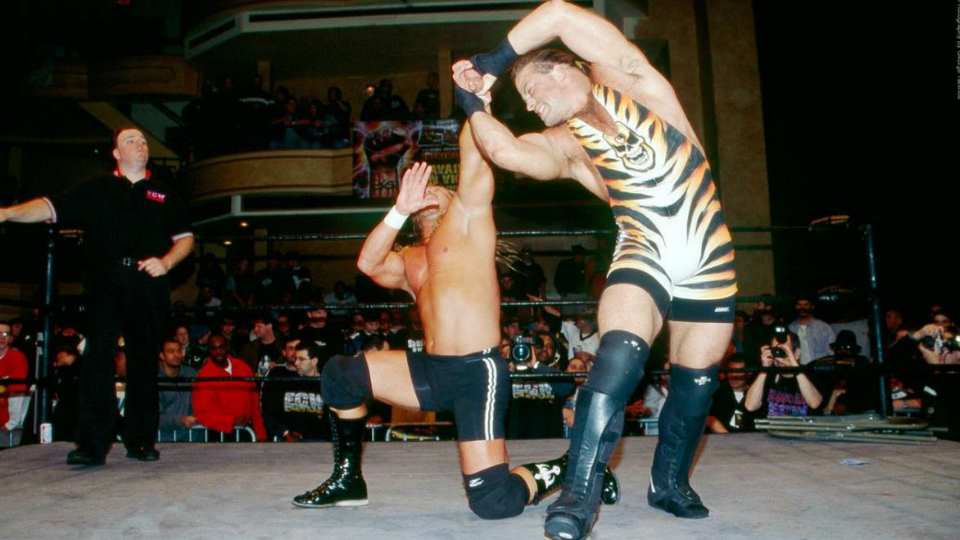
The WWF was shockingly bad and even more shockingly popular in the first half of 1999 - helped, in part, by the warp-speed decline of WCW.
ECW had also peaked as a true, seismic creative force - its identity had been subsumed by the WWF - but the Jerry Lynn Vs. Rob Van Dam programme was sensational. Its influence is hard-coded into the DNA of so much that followed. You haven’t been able to escape the martial arts stand-off ever since.
What is a trope now was mind-blowing and futuristic back then.
The action was incredible. Watching Van Dam use the chair with millisecond precision to blast Lynn with moves that were jaw-dropping enough without it was an indescribable high. Sloppy at points, no doubt, and possibly a bit too long, those matches nonetheless were jaw-dropping.
Van Dam was almost too state-of-the-art in ECW. He had to compromise his best stuff elsewhere. Lynn keeping up with and outsmarting the movez king of the day was akin to watching a great but arrogant sporting dynasty finally get an embarrassing kicking.
25. 2000: Triple H Vs. Mick Foley
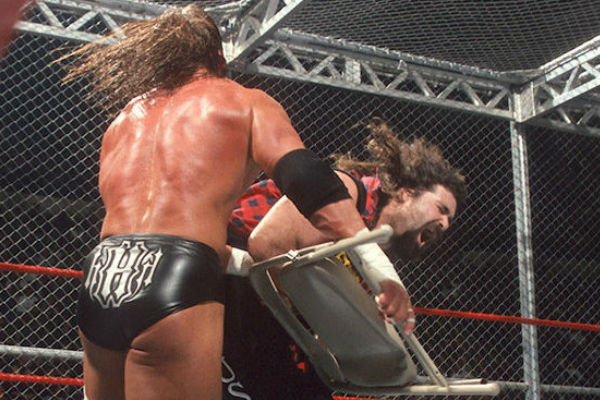
The gravity of the Mick Foley Vs. Triple H programme was undermined within weeks, but then, almost everything in WWE was.
Mick Foley reneged on his retirement vow at WrestleMania, but he could be forgiven: across January and February, his expert match layouts and unhinged physical commitment forever established Triple H was an all-the-way-over main event act.
Actually, given the events of 2003 and beyond, Foley shouldn’t be forgiven.
Triple H was fantastic throughout. His selling the fear of Cactus Jack as an alter-ego was such an iconic facial expression that the very idea of a wrestler simply pretending that they can embody a darker and more violent character with a minor aesthetic tweak might have given Chris Jericho the idea for the ‘Painmaker’.
Godddamnit. This feud was much too powerful.
The Street Fight at Royal Rumble was an in-ring masterpiece. It was the best use of the Attitude Era’s signature ultra-violence. Madison Square Garden resembled a battleground; the ultra-jacked Triple H, at last, felt like a warlord. The No Way Out sequel finished the job.
Foley might have returned - but his work was so effective that Triple H, as a headliner, never went away.
24. 2001: A Violent Odyssey
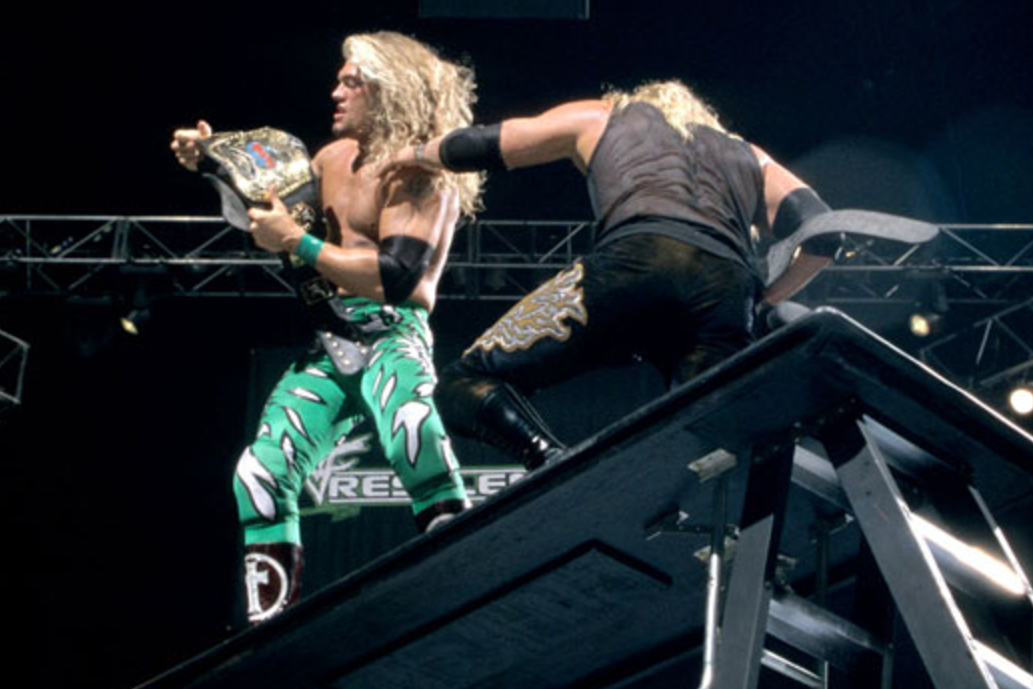
A real dearth of options here: the defining Invasion storyline was legendarily awful, everything went south after WrestleMania X-Seven, and what’s often lost is that the build to ‘Mania wasn’t exactly great either. Debra as the Rock’s manager was an awful idea: the sort of twist for a twist’s sake that underscored just how few ideas WWE creative, in need of a refresh, had left.
The Japanese scene was on its arse as well, and Ring Of Honor was a year away from slowly, indirectly changing the wrestling world.
WCW and ECW were dead by March, and while the former, incredibly, wasn’t as bad as it was in 2000, it was hardly hot.
So many characters were impossible to get behind nor even take seriously, since the desperate turns and retcons were so frequent. Since the WWF pissed away every big, promising idea, the honour might as well go to the story that culminated in the best match: Edge & Christian Vs. The Dudley Boyz Vs. The Hardy Boyz.
The story wasn’t even great, but what a goddamn match that was at WrestleMania X-Seven. As iconic as it was violent, it was also ironic. For a transgressive stunt show, an unhinged spot-fest, it has withstood time’s test more than most matches.
Had it never happened, and three teams did the exact same thing move-for-move in 2024, it would still feel futuristic.